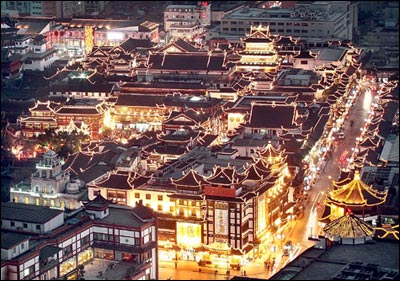Netizens on a Chinese portal website are pushing to have the Lantern Festival, which falls on Thursday -- the equivalent of Jan. 15 on the lunar calendar -- designated as a legal holiday.
Yuyuan Garden, a well-known tourist attraction in downtown Shanghai, is lit with newly installed, energy-saving lights prior to the Lantern Festival.
Lantern Festival marks the formal end to the new year festivities.
"Lantern Festival, like Tomb-Sweeping Day, Dragon Boat Festival and the Mid-Autumn Festival, is one of the best-known traditional festivals in China. Since these three are public holidays, why is Lantern Festival an exception?" wrote a netizen nicknamed "Shenliu hermit" on Sina.com. "The Lantern Festival represents part of China's cultural heritage. Making Lantern Festival an official holiday will promote the Chinese people's awareness of its significance", according to Shenliu hermit. Netizens also agreed that domestic consumption would be boosted if one more legal holiday was added onto the end of the Spring Festival. "The local government puts up a lot of lanterns along the streets during the festival each year. Since both the government and common people think highly of the festival, why not call it a day off?" a netizen named "Lan benben" from Changsha, the capital of southern Hunan Province, wrote on Sina.com, one of the portal websites in China.
On Sina, more than 500 netizens agreed that the day ought to be a legal holiday and were strongly critical of those who objected.
To add one more legal day to the current calendar seems to be too much since China has already had so many holidays, a netizen from east Shandong Province wrote. One more day off during festivals means more celebrations and more extravagance, he said.
His comment drew critics who said that he was being ironic or sick.
Under a government plan released at the end of last year, China is to abolish the May Day "Golden Week" but keep the other two week-long holidays -- the National Holiday and the Spring Festival. The May Day holidays were distributed to traditional festivals including Tomb-Sweeping Day, Dragon Boat Festival and the Mid-Autumn Festival in a bid to help carry forward Chinese history and culture and ease the burden of "Golden Weeks". The government introduced the "Golden Week" holidays in 1999 but found the week-long holidays caused problems such as overcrowding, poor service, a scarcity of hotel rooms and damage to scenic spots.
Last year, the government sought opinions online and decided to abandon the May Day "Golden Week".
The Lantern Festival was then not included in the list because the date was very close to the Spring Festival, according to the official explanation.
The Lantern Festival, also called Yuan Xiao Festival, takes place under the first full moon of lunar calendar. The festival dates back to the Han Dynasty and has a history of more than 2,000 years.
There are many forms of entertainment available during the festival, such as making and exhibiting lanterns, guessing games, lion dancing and stilt-walking.
Another important part of the Lantern Festival is eating small dumpling balls called Yuanxiao or Tangyuan, which are made of glutinous rice flour, sometimes rolled around a filling of sesame, peanuts, vegetables or meat.
The festival is widely celebrated by Chinese communities around the world.
(Xinhua News Agency February 21, 2008)


